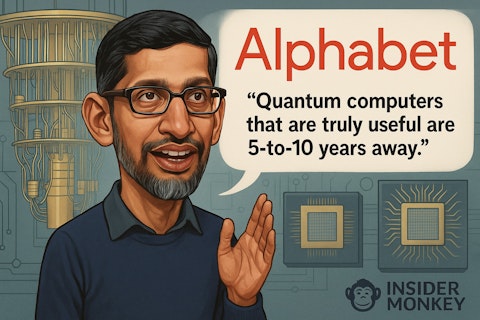In this article, we will look at 12 Best Quantum Computing Stocks to Invest in Now.
When AI first gained widespread attention a few years ago, much of the conversation focused on its potential to boost productivity, streamline data analysis, and improve efficiency within businesses. While AI has certainly made an impact in those areas, its capabilities extend far beyond.
Lesser-known but equally important applications of AI include optimizing drug development processes, detecting financial fraud, and strengthening cybersecurity systems. However, achieving significant breakthroughs in these complex fields will require more advanced AI systems. That’s where quantum computing enters the picture. Although quantum technology hasn’t yet been fully integrated with AI, its potential to unlock new levels of performance and problem-solving is immense, offering a powerful future synergy between the two fields.
Quantum computing is a new type of computing that uses the strange rules of quantum physics to solve really hard problems. Unlike regular computers that use bits (which are either 0 or 1), quantum computers use qubits (quantum bits), which can be both 0 and 1 at the same time. This lets them handle a lot more information at once. Qubits can also be linked together in a special way called entanglement, which makes them even more powerful. Although today’s quantum computers are still early and not perfect, they’re improving fast and could one day change fields like medicine, finance, and cybersecurity.
In a recent CNBC interview, Executive Chair & Chairman of the Board of IonQ, provided insights into the company’s strategy and vision for the future of quantum computing and its integration with artificial intelligence. Chapman explains that the company uses a unique approach to building quantum computers based on trapped-ion technology, which offers greater stability and scalability than other quantum systems. This method allows for more precise control over qubits, which is essential for solving complex computational problems currently beyond classical computers’ reach.
Quantum Computing Can Enhance AI Capabilities
Chapman discusses how quantum computing can significantly enhance AI capabilities. Traditional AI algorithms, especially those involving large datasets and intricate optimization challenges, are limited by the processing power of classical systems. Quantum computers, however, have the potential to process exponentially larger datasets and perform calculations that would otherwise take years. This could lead to breakthroughs in areas like drug discovery, supply chain optimization, and financial modeling. The former CEO also highlighted the company’s focus on practical applications rather than just theoretical advancement. The company is actively developing quantum algorithms specifically designed to complement AI models, and it is working with major tech firms and research institutions to accelerate real-world adoption. Chapman envisions a future where quantum computing becomes a critical tool for AI development, enabling smarter, faster, and more efficient solutions across industries.

Our Methodology
To compile the list of 12 Best Quantum Computing Stocks to Invest in Now, we conducted thorough research, analyzing multiple financial media reports and industry reports. Starting with an initial list of 20 companies, we narrowed it down by choosing pure-play quantum computing stocks that are popular among elite hedge funds. The final selection is ranked in ascending order of their hedge fund sentiment, as of Q4 2024.
At Insider Monkey, we are obsessed with the stocks that hedge funds pile into. The reason is simple: our research has shown that we can outperform the market by imitating the top stock picks of the best hedge funds. Our quarterly newsletter’s strategy selects 14 small-cap and large-cap stocks every quarter and has returned 373.4% since May 2014, beating its benchmark by 218 percentage points (see more details here).
12 Best Quantum Computing Stocks to Invest in Now
12. SEALSQ Corp (NASDAQ:LAES)
Number of Hedge Fund Holders: 4
SEALSQ Corp (NASDAQ:LAES) is a Swiss-based leader in post-quantum digital security, specializing in secure microcontrollers, PKI services, and personalization solutions. It develops hardware and software designed to protect against future quantum threats, including quantum-resistant chips launching in late 2025. With a strong focus on secure IoT, smart infrastructure, and critical systems, SEALSQ offers end-to-end protection through its Root of Trust, PKI, and embedded identity technologies, serving industries like healthcare, automotive, smart cities, and consumer electronics.
SEALSQ Corp (NASDAQ:LAES) reported $11 million in revenue in 2024, down from $30 million in 2023, due to a strategic shift from traditional semiconductors to quantum-resistant chips. Despite the short-term revenue dip and a net loss of $21 million, the company strengthened its balance sheet, raising over $80 million and holding more than $90 million in cash, with no debt. SEALSQ plans to invest $7.2 million in R&D in 2025 and expects strong revenue growth driven by post-quantum security demand.
SEALSQ Corp (NASDAQ:LAES) anticipates strong revenue growth in 2025 and 2026, driven by post-quantum chip certifications, strategic acquisitions, and expansion of chip personalization centers globally. The company has made strategic investments such as $20M in quantum and AI startups, such as Colibri and IC’ALPS, to enhance its quantum platform. With $6.8M in bookings and a $93M pipeline, SealSQ targets sectors like public infrastructure and IoT. The company’s strategy focuses on product launches, R&D, acquisitions, and expanding managed PKI services to lead in post-quantum cybersecurity.
11. Quantum Computing Inc. (NASDAQ:QUBT)
Number of Hedge Fund Holders: 6
There is growing demand for high-performance computing due to AI and large data needs, yet classical computers face limits, especially in optimization tasks. Quantum Computing Inc. (NASDAQ:QUBT) leverages integrated photonics and nonlinear quantum optics to develop scalable, energy-efficient quantum technologies, including the Entropy Quantum Computer (EQC). With applications in computing, sensing, and cybersecurity, and a focus on lithium niobate chip development, the company is positioned for growth in the expanding quantum and photonics markets.
During Q4 2024, Quantum Computing Inc. (NASDAQ:QUBT) made significant operational and financial strides, including securing NASA contracts for quantum LiDAR optimization and phase unwrapping tasks. Its Dirac-3 quantum machine, operating at room temperature with low power use, addresses real-world optimization problems. The company’s chip foundry in Arizona is nearing production, with pre-orders and strategic partnerships secured. Its growing market engagement and product deployments demonstrate that practical quantum solutions are already in use today.
Quantum Computing Inc. (NASDAQ:QUBT) aims to scale its quantum photonic solutions and foundry operations, with revenue growth expected from its Dirac-3 machines and TFLN chip production. Q4 2024 revenue was $62K with improved gross margin and reduced cash usage. The company raised $192M in capital, boosting assets and equity. It remains focused on innovation, commercialization, and expanding both domestic and international customer engagement.
10. Arqit Quantum Inc. (NASDAQ:ARQQ)
Number of Hedge Fund Holders: 8
Arqit Quantum Inc. (NASDAQ:ARQQ) is a cybersecurity company offering a unique symmetric key agreement platform, Arqit SKA-Platform™, which delivers quantum-safe encryption through a scalable software-only solution requiring no new hardware. Rebranded in 2024 from QuantumCloud™, it uses secure replicated entropy distribution and lightweight software agents to generate unbreakable keys on devices. Validated by the University of Surrey and aligned with NSA guidelines, Arqit is targeting widespread adoption via platform-as-a-service sales, supported by partnerships with major tech firms like Intel, AWS, and Dell.
Arqit Quantum Inc. (NASDAQ:ARQQ) has seen strong momentum and a strategic shift under new CEO Andy Leaver. Leaver, with deep software industry experience, emphasized Arqit’s unique symmetric key agreement software, growing market demand, and increasing industry recognition. Engagements with telecom providers and government sectors are growing, supported by compliance with NSA standards and endorsements like IDC Innovator status. Arqit aims to capitalize on rising quantum encryption awareness in 2025. Meanwhile, the company has secured a seven-figure, multi-year contract with a major Middle Eastern government agency via a distribution partner, expected to generate annual recurring revenue starting in fiscal 2025. This strategic win positions Arqit Quantum Inc. (NASDAQ:ARQQ) for further expansion in government and military markets.
9. D-Wave Quantum Inc. (NYSE:QBTS)
Number of Hedge Fund Holders: 15
D-Wave Quantum Inc. (NYSE:QBTS), a pioneer in quantum computing for over 25 years, leads the industry in commercial-grade annealing quantum solutions. It was the first to launch commercial systems, achieve quantum supremacy on a real-world problem, and run production quantum applications. Its Advantage2™ system shows significant performance gains, and its quantum-AI initiatives aim to boost customer ROI. D-Wave’s full-stack offerings, cloud access, and continued innovation in both annealing and gate-model systems position it at the forefront of enterprise quantum computing adoption.
D-Wave Quantum Inc. (NYSE:QBTS) reported a strong Q1 for fiscal 2025, with record revenue of $15 million, compared to $2.46 million in Q1 2024, driven by the first Advantage2 system sale. The company achieved key milestones, including a landmark quantum supremacy demonstration, advancements in Advantage2 performance, and enhancements in hybrid solvers and quantum AI tools. With a robust $304 million cash position, expanding customer base, and new production deployments, D-Wave continues to lead in enterprise quantum computing. The quarter also marked the lowest net loss since going public in 2022.
The company emphasized that Davidson is a strategic partner focused on developing defense and security applications using its quantum system. It also highlighted its leadership in cryogenic control and error mitigation for annealing quantum systems. System sales are gaining traction, especially in blockchain and AI, which favor owning hardware. Meanwhile, US government interest remains limited due to a gate-model bias, though D-Wave is optimistic this may change. The company also made strong progress on commercial engagement, technical milestones, and revenue per customer.
8. Rigetti Computing, Inc. (NASDAQ:RGTI)
Number of Hedge Fund Holders: 17
Rigetti Computing, Inc. (NASDAQ:RGTI) builds and operates quantum computers designed to solve complex problems with superior speed and energy efficiency. The company’s scalable, patented multi-chip architecture underpins next-gen systems targeting breakthroughs in climate, healthcare, and AI. As a vertically integrated company with its own fabrication facility, the company controls chip production and deploys full-stack solutions via cloud services and hardware sales. With the 2024 launch of our high-fidelity 84-qubit Ankaa-3 system, Rigetti Computing, Inc. (NASDAQ:RGTI) continues advancing performance and accessibility for partners and researchers in quantum computing.
Rigetti Computing, Inc. (NASDAQ:RGTI) has over a $100 million strategic partnership with Quanta Computer, a leading Taiwanese electronics manufacturer, which will also invest $35 million in Rigetti’s stock. Rigetti launched its 84-qubit Ankaa-3 system, achieving significant improvements in gate fidelity. Rigetti also plans to scale beyond 100 qubits by year-end using modular chiplet architecture. With $217 million in cash and investments, plus the Quanta deal, Rigetti anticipates sufficient funding for at least three years, focusing on R&D and aiming for commercial readiness within four to five years. Rigetti is working to demonstrate a 4×9 qubit fidelity of 99.5% by mid-2025, a key milestone in its roadmap focused on chiplet-based tiling architecture. Collaborations with QphoX and Qblox aim to replace bulky coax cables with flex and eventually fiber optics, crucial for scaling beyond 100,000 qubits. Rigetti is also pursuing a $300 million+ DARPA project to build a utility-scale quantum computer by 2033. Its open, modular architecture is seen as a competitive advantage, allowing integration of third-party innovations and making it a top contender alongside IBM and Google.
7. FormFactor, Inc. (NASDAQ:FORM)
Number of Hedge Fund Holders: 26
FormFactor, Inc. (NASDAQ:FORM) makes high-performance probe cards, analytical probes, probe stations, thermal, and cryogenic systems for semiconductor and scientific applications. Its products support the full device lifecycle from R&D to high-volume production, enabling customers to improve yield and efficiency. The company operates in two segments—Probe Cards and Systems. It specializes in precision testing technologies, including MEMS-based contact elements, cryogenic instruments, and integrated measurement systems. Continued innovation, strong IP, and strategic acquisitions position them for leadership from lab-scale research to commercial semiconductor manufacturing.
FormFactor, Inc. (NASDAQ:FORM)’s Q1 2025 revenue was $171.4 million, a 1.6% increase year-over-year, however, it saw a 9.6% sequential decline. Its System segment, which is closely tied to quantum computing, saw reduced revenue in Q1 2025, consistent with expectations, but is forecasted to grow moderately in Q2. This growth is being driven by customer innovations in quantum computing and high-performance computing, requiring advanced measurement tools like CM300 and IQ3000 cryogenic probers. A key driver is demand for co-packaged optics (CPO) in data centers, where FormFactor’s systems test photonic integrated circuits (PICs). The company’s early collaborations and installed base of over 100 silicon photonic systems support its leadership in the lab space, now expanding to production. Multiple systems are shipping in Q2 to enable high-volume PIC production, underpinning future growth.
FormFactor, Inc. (NASDAQ:FORM) expects continued strong revenue from its leading HBM (High Bandwidth Memory) customer during the transition from HBM3 to HBM4, with HBM4 sampling underway and additional revenue from second and third HBM customers. The company is also seeing new fab ramps and potential PC refresh cycles. FormFactor is advancing in co-packaged optics and GPU probe card qualifications, leveraging its strength in lab and production testing as test intensity rises with advanced packaging.
6. IonQ, Inc. (NYSE:IONQ)
Number of Hedge Fund Holders: 28
IonQ, Inc. (NYSE:IONQ) is developing advanced quantum computers and networks to address complex global problems and drive innovation across industries. Its proprietary and licensed technologies offer strategic advantages in both R&D and commercialization. The company sells quantum hardware, provides access via major cloud platforms, and offers its services and support to customers with professional services.
IonQ’s Q1 2025 earnings call highlighted its strategic expansion into quantum computing and networking. Niccolo de Masi assumed the CEO role, and Jordan Shapiro was promoted to lead Quantum Networking. IonQ, Inc. (NYSE:IONQ) announced acquisitions of Lightsynq and Capella to enhance quantum interconnects and space-based quantum key distribution, respectively. The company sold a Forte Enterprise system to EPB. IonQ’s revenue growth was flat year-on-year, at $7.6 million and a net loss of $32.3 million. The company reaffirmed its 2025 guidance, emphasizing ongoing R&D and commercialization investments to drive future growth.
IonQ, Inc. (NYSE:IONQ) is making major strides in quantum computing and quantum networking. It has acquired Lightsynq, which brings advanced diamond-based quantum memory—a type of long-lasting data storage that helps send quantum information over distances. This memory works with various quantum hardware types like ion traps and neutral atoms, thanks to the company’s frequency conversion tech (which adjusts photon signals so different systems can connect). It is also using Capella’s technology for secure communication in space, which helps expand both ground and satellite-based quantum networks. IonQ plans to use these parts to build the quantum internet—a future system where quantum computers link together securely over long distances. This is valuable for enterprises, the military, and critical infrastructure, especially as traditional encryption becomes vulnerable to future quantum attacks.
5. International Business Machines Corporation (NYSE:IBM)
Number of Hedge Fund Holders: 60
International Business Machines Corporation (NYSE:IBM) is a quantum computing company that has been investing in the technology for years. The company offers cloud access to its quantum systems and has built tools and partnerships to help businesses and researchers develop quantum applications. With a clear roadmap toward making quantum practical and useful, IBM stands out as a key player in this fast-developing field.
IBM’s Q1 2025 earnings showed strong performance, exceeding expectations with $14.5 billion in revenue and $2 billion in free cash flow. The company reported solid growth in software, led by Red Hat and AI solutions, while consulting revenue remained stable. IBM’s hybrid cloud and AI-focused strategy drove success, with significant traction in generative AI. The company remains confident in its full-year guidance of 5%+ revenue growth and $13.5 billion in free cash flow. IBM’s diversified portfolio and strong client relationships position it well for future growth despite macro uncertainties. In Q1 2025, International Business Machines Corporation (NYSE:IBM) expanded quantum capabilities with Europe’s first IBM Quantum System Two. The company highlighted its leadership in generative AI and virtualization technologies, which intersect with quantum computing infrastructure. IBM’s software portfolio, including Red Hat OpenShift, is positioned to support emerging quantum workloads.
4. Honeywell International Inc. (NASDAQ:HON)
Number of Hedge Fund Holders: 67
Honeywell International Inc. (NASDAQ:HON) is a multinational conglomerate known for its innovations in aerospace, automation, and advanced technologies. Honeywell has taken major strides in quantum computing through its dedicated subsidiary, Quantinuum, which was created by merging Honeywell Quantum Solutions with Cambridge Quantum Computing in 2021. This strategic move positioned Honeywell as a leader in the quantum technology space. The company has achieved notable breakthroughs in quantum volume, demonstrating improvements in computational performance. In cybersecurity, Honeywell has integrated quantum-hardened encryption keys into smart utility meters, enhancing data protection against emerging threats. Collaborations with partners like Microsoft have also advanced quantum error correction, a vital component for scalable quantum systems. These initiatives reflect Honeywell’s commitment to transforming industries such as cybersecurity, materials science, and artificial intelligence through practical and secure quantum computing applications.
Bank of America (BofA) has upgraded Honeywell (NASDAQ:HON) to Buy from Neutral and increased its price target to $250 from $210, citing a return to stable or positive earnings revisions after a strong Q1 performance. Shares rose over 2% in premarket trading. Honeywell had underperformed industrial peers due to negative revisions and missed expectations, but BofA now sees improved earnings visibility. “Honeywell is one of the most discounted names in our coverage on a terminal growth basis,” analysts said, adding, “we believe the company can start to close some of the valuation gap vs. peers.” The firm raised its 2025 EPS estimate to $10.44, slightly above consensus, and expects $11.54 for 2026. BofA also cited stronger internal forecasting and guidance, following meetings with Honeywell’s CEO and CFO, as key factors boosting investor confidence.
3. NVDIA Corporation (NASDAQ:NVDA)
Number of Hedge Fund Holders: 223
NVIDIA Corporation (NASDAQ:NVDA) supports quantum computing primarily through its advanced hardware and software platforms that accelerate quantum research and simulation. While not building quantum hardware, NVIDIA plays a crucial role in enabling hybrid quantum-classical computing via its CUDA Quantum platform, which integrates classical GPU computing with quantum circuits. This helps researchers and developers simulate quantum algorithms on NVIDIA GPUs, speeding up quantum software development. Partnerships with leading quantum hardware companies further position NVIDIA as an essential enabler in the broader quantum ecosystem.
According to Reuters, NVIDIA Corporation (NASDAQ:NVDA) recently introduced CUDA-Q, an open-source platform designed to facilitate the development of quantum applications. This initiative aims to bridge the gap between classical and quantum computing, enabling researchers to leverage CUDA’s parallel processing power for quantum simulations and optimizations. Notably, NVIDIA’s collaboration with French quantum computing firm Pasqal exemplifies this integration, as Pasqal plans to incorporate CUDA-Q into its quantum computing units and cloud platform, thereby providing a high-performance computing interface for the quantum community. Additionally, at the NVIDIA GTC 2025 conference, the company unveiled CUDA-X, a suite of libraries optimized for its new GH200 and GB200 superchips. These libraries offer up to 11x speedups for computational engineering tools and support calculations up to five times larger than traditional architectures, further enhancing CUDA’s utility in complex quantum and AI workloads.
2. Alphabet Inc. (NASDAQ:GOOGL)
Number of Hedge Fund Holders: 234
Alphabet Inc. (NASDAQ:GOOGL) is considered a quantum computing company primarily through its research arm, Google Quantum AI. The company is at the forefront of quantum computing development, aiming to build practical, scalable quantum computers. In 2019, the company claimed to achieve “quantum supremacy”, where its 53-qubit quantum processor, “Sycamore” completed a task in 200 seconds that would take the fastest classical supercomputers thousands of years. It continues to invest heavily in quantum hardware, software, and algorithms, with the long-term goal of solving real-world problems in materials science, cryptography, and machine learning.
Alphabet Inc. (NASDAQ:GOOGL) recently introduced the Willow chip, a 105-qubit superconducting quantum processor. This processor achieved a Random Circuit Sampling task in approximately five minutes—a computation that would take classical supercomputers about 10^25 years. A significant advancement is its ability to perform “below threshold” quantum error correction, enhancing reliability as more qubits are added. Meanwhile, Hartmut Neven, head of Google Quantum AI, has stated that the company anticipates commercial quantum computing applications within five years. These applications are expected to impact fields such as materials science, pharmaceuticals, and energy. This optimistic outlook contrasts with NVDIA CEO Jensen Huang’s prediction of a 15–30 year timeline for practical quantum computing. In February 2025, Google Quantum AI announced a partnership with the University of Chicago and the University of Tokyo, committing up to $100 million over ten years. The initiative focuses on advancing fault-tolerant quantum computing through research, entrepreneurship, and workforce training. Google’s advancements in quantum computing position it as a leader in the field, alongside competitors like IBM, Microsoft, and Amazon. While the industry remains in early stages, these developments suggest a growing momentum toward practical quantum applications in the coming years.
1. Microsoft Corporation (NASDAQ:MSFT)
Number of Hedge Fund Holders: 317
Microsoft Corporation (NASDAQ:MSFT) is a key player in quantum computing, offering a Quantum Development Kit (QDK) and the Q# programming language to help developers build quantum applications. Through Azure Quantum, it provides cloud access to quantum hardware from various providers, enabling a unified platform for experimentation. The company focuses on topological qubits, aiming for more stable, scalable quantum systems. Microsoft also invests in quantum algorithms, especially in quantum chemistry and optimization, and collaborates with industry leaders and research institutions to advance quantum technology and its real-world applications.
In its Q3 2025 earnings call, Microsoft emphasized progress in quantum computing as part of its broader cloud and AI strategy. The company is advancing toward utility-scale quantum computing with the development of Majorana-1, a potential breakthrough qubit. CEO Satya Nadella emphasized that these qubits are smaller, faster, and more reliable, marking a significant step toward practical quantum computing applications in fields like drug discovery and sustainable agriculture. The company is also integrating its quantum stack with partner hardware via Azure Quantum, offering customers access to quantum capabilities in the cloud. These efforts position Microsoft at the forefront of the quantum future, aiming to enable more powerful computing solutions that can solve complex problems beyond the reach of classical systems.
While we acknowledge the growth potential of MSFT, our conviction lies in the belief that AI stocks hold great promise for delivering high returns and doing so within a shorter time frame. There is an AI stock that went up since the beginning of 2025, while popular AI stocks lost around 25%. If you are looking for an AI stock that is more promising than MSFT but that trades at less than 5 times its earnings, check out our report about this cheapest AI stock.
READ NEXT: 20 Best AI Stocks To Buy Now and 30 Best Stocks To Invest In According to Billionaires.
Disclosure: None. Insider Monkey focuses on uncovering the best investment ideas of hedge funds and insiders. Please subscribe to our free daily e-newsletter to get the latest investment ideas from hedge funds’ investor letters by entering your email address below.





